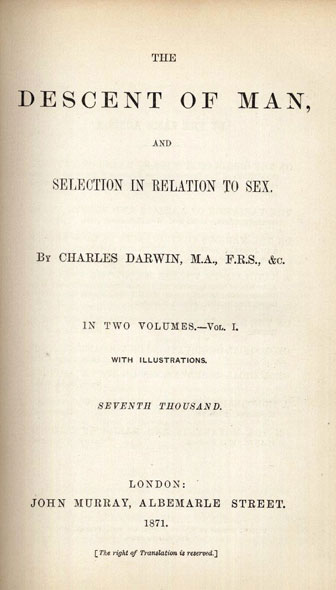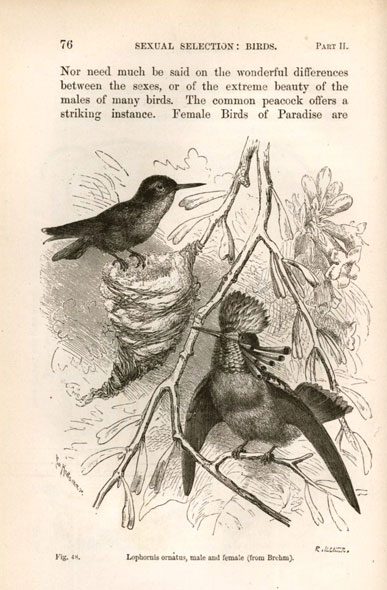Sexual selections

When Charles Darwin was completing the book that became the Descent of Man (1871), the idea that humans had descended from a tree-dwelling primate had been widely – though not universally – accepted. One of the biggest problems he faced in reaching his wide audience was sex. The first part of his manuscript dealt with broad issues of human evolution; but the second and larger part introduced the idea of 'sexual selection', in which competition for mates ultimately produced different varieties. In animals, females did the selecting; in humans, the choice was made by males. At the most general level, Darwin used sex to explain race.
John Murray III was a respectable publisher in the heart of London's West End. His reputation had been crucial to the reception of Darwin's other books, ensuring that their controversial arguments were treated (for the most part) with attention and respect. But the pervasive significance of sex in the new book's argument created problems, as Gowan Dawson has shown in a fascinating study. The original title Darwin proposed, although his letter has been lost, forthrightly included the words 'sexual selection'. As an alternative, he then proposed 'The Descent of Man, and Selection according to Sex'. Murray was relieved to 'be rid of an objectionable adjective'. Sexual, in its adjectival form, hinted at a dangerously pervasive influence of sexuality. In the final version, 'according to' was replaced by the even more innocuous 'in relation to'.

More than these shifts in language, it was Murray's reputation, together with the format and general appearance of Descent, which vouchsafed respectability. It was a big book with many footnotes (including two translated into Latin to ensure decency!) and other signs of a serious work of natural science. Long parts are dry as dust, with lists of facts relating to birds, insects and other animals. Of Darwin's most significant books, it is almost certainly the least read in full.
It is possible to abridge the Descent of Man, to bring out both its main arguments and its more contentious statements. I have recently done this, in an anthology of Darwin's evolutionary writings for Oxford World's Classics. Such selections inevitably underline the significance of sex in the work. For modern readers, it is important to recognize that Darwin's writings, which are often read as dealing primarily with biogeography, geology and similar fields are also fundamentally about inheritance and reproduction. These readings inevitably bring Descent closer to the title Murray disliked so much, with that 'objectionable adjective', sexual.
Jim Secord (HPS, Cambridge)
Further reading
Gowan Dawson, Darwin, Literature and Victorian Respectability (Cambridge: Cambridge University Press, 2007)
Charles Darwin, Evolutionary Writings, edited by James A. Secord (Oxford: Oxford University Press, 2008)
